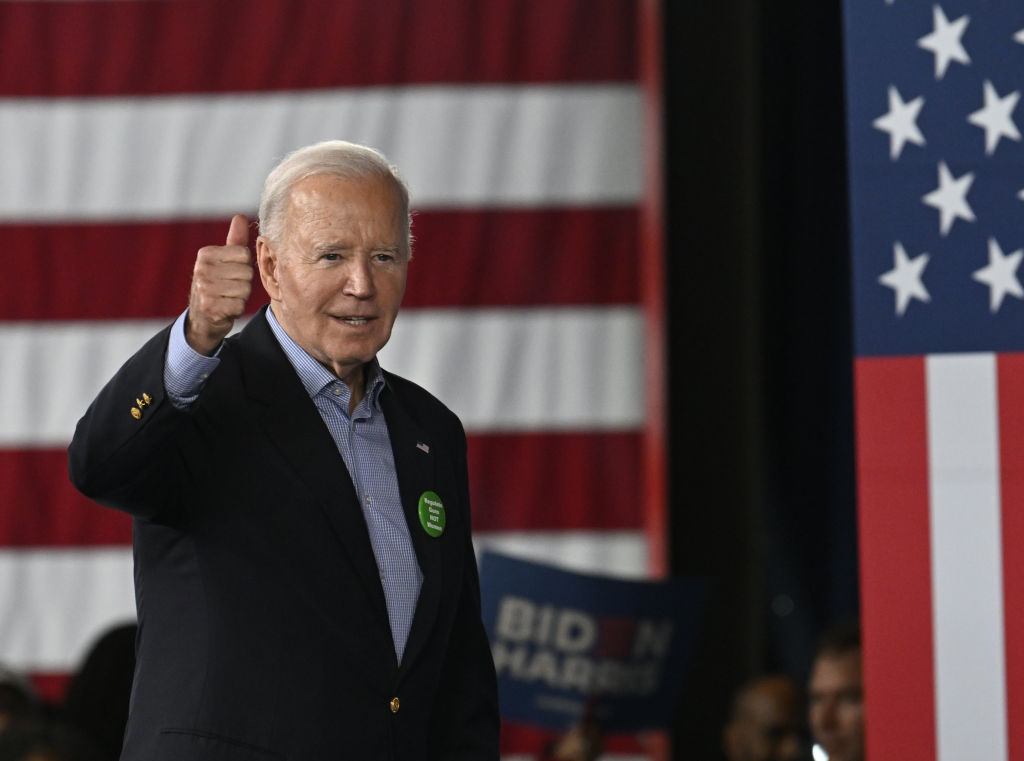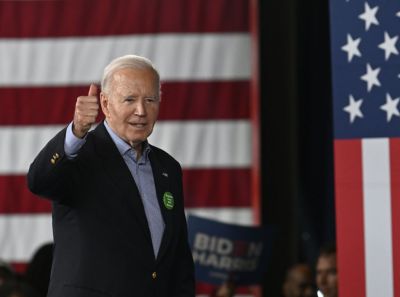Happy Monday! Congratulations to Oppenheimer for cleaning up at the Academy Awards, including Robert Downey Jr., who won best supporting actor for a role we Washingtonians can really appreciate: a Cabinet nominee awaiting Senate confirmation.
Up to Speed
- Democratic donors certainly seem energized by President Joe Biden’s State of the Union address last week. NBC News reports that the president’s campaign took in $10 million in donations in the 24 hours since the speech before both houses of Congress. That boosts Biden’s already massive reserves, last reported in February at $56 million. Biden is also significantly ahead of the presumptive Republican nominee, Donald Trump, who reported just over $30 million cash on hand.
- Democrats hold a fundraising advantage elsewhere, with the Democratic National Committee reporting $24 million in cash and the Republican National Committee just $9 million back in February. Money isn’t everything in a presidential election—in 2016, for instance, Trump defeated the better funded Hillary Clinton—but Democrats and Republicans both have told Dispatch Politics that Biden’s lead in the race for dollars could do a great deal to close the polling gap, from buying negative ads to bring down Trump’s relatively good numbers to funding get-out-the-vote efforts.
- Republicans looking to turn around those abysmal fundraising numbers will put a lot of hope in the turnover at the RNC, which late last week elected a new, Trump-backed leadership team at its meeting in Houston. Michael Whatley of North Carolina was elected the new chairman, succeeding longtime chair Ronna McDaniel, with Trump’s daughter-in-law Lara Trump elected co-chair and Trump campaign adviser Chris LaCivita adding on a new role as the RNC’s chief of staff. LaCivita, meanwhile, has tapped former RNC chief operating officer, attorney Sean Cairncross, to be his deputy at the committee, Axios reports. Cairncross’ main responsibilities will be to monitor the party’s finances.
- The RNC takeover by Team Trump was to be expected now that the former president is the party’s presumptive nominee, but questions still remain about whether the new team will be able to revamp the committee’s dismal balance sheet. Henry Barbour, an RNC committeeman from Mississippi who had been a strong ally of McDaniel’s, told Dispatch Politics he is hopeful. “Momentum will do more for fundraising than anything,” Barbour said. “Just that donors think you are going to win helps immensely, and the numbers give Republicans a reason to think we should win a lot of races this year, including the White House.”
- There’s a new candidate in the Senate Republican leadership sweepstakes. Politico’s Burgess Everett reported Monday that Sen. Joni Ernst of Iowa is running for conference chair, the No. 3 ranking GOP leadership post. Ernst’s entry would pit her against Sen. Tom Cotton of Arkansas, who announced he’s running for the position last week. Ernst, currently the conference’s Republican Policy Committee chair—the No. 4 post—is an ally of Senate Minority Leader Mitch McConnell, who is stepping down from his leadership position in November after 18 years at the helm.
- After you’ve read The Dispatch’s recent editorial about the 2024 presidential election, be sure to read the response from our colleague Nick Catoggio, who urges conservative opponents of Trump to vote for Biden as the only plausible way to defeat the former president. “There needs to be much more anger from the center-right toward the populist right. That project starts with making sure Trump loses this fall,” Nick writes.
Biden Hits the Trail as Race Against Trump Intensifies

Will he or won’t he?
For several months, Democrats and Republicans alike have been asking if Joe Biden will pursue the sort of robust, in-person campaign itinerary that has characterized White House contests in the modern era. Given voters’ grave concerns about the 81-year-old president’s age in a race against presumptive Republican nominee Donald Trump, an aggressive campaigner whose signature rallies attract thousands, it’s a politically pertinent question.
On the heels of Thursday’s State of the Union address, the president began to answer that question.
Biden traveled Friday to Philadelphia, hosting a campaign rally in a suburban middle school gymnasium. Then, after overnighting briefly at his home in Wilmington, Delaware, the president flew Saturday to Atlanta, where he met with minority small business owners and held his second campaign rally in two days (Trump was roughly 70 miles northwest in Rome, Georgia, hosting his own rally.)
On Monday, Biden was scheduled to hit his third battleground state in four days, heading to New Hampshire for two events—the first at a YMCA in tiny Goffstown organized by the White House and the second a campaign gathering in Manchester. Also this week, according to a preview of the president’s schedule issued by the White House, Biden is set to parachute into Wisconsin (Wednesday in Milwaukee) for another pair of events—one official, one political—and Michigan (Thursday in Saginaw, a heavily black and Hispanic community) for a campaign event.
Whether a presidential candidate can handle the mental and physical rigors of near daily cross-country campaigning typically isn’t much of an issue.
But Biden is the oldest president in American history, and therefore the oldest president to seek reelection. Even Democratic voters who supported him four years ago and plan to do so again are unconvinced he’s up to the task. A recent New York Times poll found that a majority of voters who pulled the lever for Biden in 2020 believe he’s “too old to be effective.” Keeping voters from changing their mind is a crucial component of team Trump’s strategy to recapture the White House.
“If Biden wins, can he even survive till 2029?” says the voiceover in a new TV ad from Make America Great Again Inc., Trump’s designated super PAC. Biden is moving to reverse these doubts by openly acknowledging his age, and empathizing with voters’ anxiety, and claiming it as a unique strength. “Look, I’m not a young guy, that’s no secret. But here’s the deal: I know how to get things done for the American people,” the president says, speaking straight to camera, in a fresh campaign spot.
Part of Biden’s challenge is how he presents physically, with a shuffling walk his late February medical report attributes to “wear and tear” on his spine, plus other ailments common for men his age—although his doctors say the president, categorically, is fit for duty. But the other part relates to the fact that Biden’s ability to campaign on a daily basis was not tested four years ago.
In 2020, the country was reeling from the deadly coronavirus pandemic. Most Americans, but especially the elderly most vulnerable to COVID-19, shut themselves in at home to avoid getting sick. And so for most of the general election campaign after becoming the presumptive Democratic nominee, Biden appealed for votes, virtually, from his home office in Wilmington. Trump eventually abandoned virtual campaigning for his usual big-tent rallies, ridiculing Biden for clinging to a “basement” campaign strategy.
Republicans in particular argue that Biden got lucky and could not have absorbed the shocks of regular campaigning, while Democratic insiders, pointing to the president’s travel schedule as chief executive, say otherwise. Eight months from now, we’ll know which side is right.
Can No Labels Find a High-Profile Candidate?
As we and others reported last week, No Labels is moving forward with selecting a “unity” presidential ticket to compete in the 2024 election. The question, as it has been since the bipartisan centrist group started talking up fielding a challenger against Joe Biden and Donald Trump, remains: Who will be on it?
On Friday, the Wall Street Journal reported that No Labels was considering Geoff Duncan, the former lieutenant governor of Georgia and a Republican critic of Trump following the 2020 election, as its presidential candidate. Dispatch Politics was told by a source close to Duncan that the Journal’s reporting is accurate, but it’s unclear whether Duncan himself is actively seeking or considering accepting a nomination. A spokeswoman for No Labels did not respond to a request for comment.
Duncan is a contributor to CNN and appears often on the cable network, but he is hardly a household name. His selection would confirm what many observers of No Labels’ effort have expressed privately for months: that the group has struggled to appeal to high-profile political figures with the name recognition necessary to mount an independent presidential bid.
What is remarkable about Duncan’s name being floated is that other, more well-known names do not appear to be interested—even as the group has been conducting interviews for weeks with possible contenders.
Early targets such as Sens. Mitt Romney and Joe Manchin have publicly indicated they aren’t interested in taking on the No Labels mantle, with Romney even saying last year he thought a No Labels presidential candidate was a mistake that would help elect Trump. Another potential recruit was former Maryland Gov. Larry Hogan, a Republican who has previously served in a ceremonial role as No Labels co-chair. But Hogan stepped down from No Labels in January and is instead running for the Senate. And days before she dropped out of the Republican presidential primary, Nikki Haley made it clear to reporters that she would not seek a third-party candidacy through No Labels.
Also notable are those potential candidates—largely Republicans who have expressed opposition or dissatisfaction to Trump—who have not been publicly floated. The Journal, for instance, also reported that Georgia Gov. Brian Kemp had been approached by No Labels and “declined.” It’s unclear if other well-known political figures, such as former Rep. Liz Cheney and former Gov. Chris Christie, remain in the running.
A month ago, shortly after leaving the race for the GOP nomination, Christie expressed an openness to No Labels. Cheney, meanwhile, hinted at her interest in a third-party run during an interview with the Washington Post late last year. Since then, however, the former Wyoming congresswoman has said nothing publicly about a presidential run or No Labels.
“Perhaps they aren’t interviewing the potential candidates as much as it’s the potential candidates hearing their pitch or interviewing them and then—by all accounts—walking away unimpressed,” said one person familiar with No Labels’ outreach to political figures.
Notable and Quotable
Has there EVER been a WORSE HOST than Jimmy Kimmel at The Oscars. His opening was that of a less than average person trying too hard to be something which he is not, and never can be. Get rid of Kimmel and perhaps replace him with another washed up, but cheap, ABC ‘talent,’ George Slopanopoulos. He would make everybody on stage look bigger, stronger, and more glamorous. Also a really bad politically correct show tonight, and for years - Disjointed, boring, and very unfair. Why don’t they just give the Oscars to those that deserve them. Maybe that way their audience and TV ratings will come back from the depths. MAKE AMERICA GREAT AGAIN!
—Former President Donald Trump, on his Truth Social account, March 10, 2024







Please note that we at The Dispatch hold ourselves, our work, and our commenters to a higher standard than other places on the internet. We welcome comments that foster genuine debate or discussion—including comments critical of us or our work—but responses that include ad hominem attacks on fellow Dispatch members or are intended to stoke fear and anger may be moderated.
With your membership, you only have the ability to comment on The Morning Dispatch articles. Consider upgrading to join the conversation everywhere.